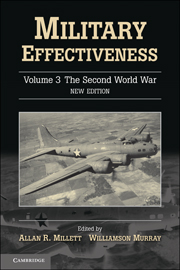Book contents
- Frontmatter
- Contents
- List of Contributors
- Introduction: Military Effectiveness Twenty Years After
- Maps
- 1 The Effectiveness of the Japanese Military Establishment in the Second World War
- 2 The United States Armed Forces in the Second World War
- 3 British Military Effectiveness in the Second World War
- 4 The Italian Armed Forces, 1940–3
- 5 The Dynamics of Volksgemeinschaft: The Effectiveness of the German Military Establishment in the Second World War
- 6 Bitter Victory: French Military Effectiveness during the Second World War
- 7 The Soviet Armed Forces in the Great Patriotic War, 1941–5
- 8 Military Effectiveness in the Second World War
- 9 Challenge and Response at the Operation and Tactical Levels, 1914–45
- 10 The Political and Strategic Dimensions of Military Effectiveness
- Index
7 - The Soviet Armed Forces in the Great Patriotic War, 1941–5
Published online by Cambridge University Press: 05 June 2012
- Frontmatter
- Contents
- List of Contributors
- Introduction: Military Effectiveness Twenty Years After
- Maps
- 1 The Effectiveness of the Japanese Military Establishment in the Second World War
- 2 The United States Armed Forces in the Second World War
- 3 British Military Effectiveness in the Second World War
- 4 The Italian Armed Forces, 1940–3
- 5 The Dynamics of Volksgemeinschaft: The Effectiveness of the German Military Establishment in the Second World War
- 6 Bitter Victory: French Military Effectiveness during the Second World War
- 7 The Soviet Armed Forces in the Great Patriotic War, 1941–5
- 8 Military Effectiveness in the Second World War
- 9 Challenge and Response at the Operation and Tactical Levels, 1914–45
- 10 The Political and Strategic Dimensions of Military Effectiveness
- Index
Summary
Introduction
Any attempt to explain rationally the complex problem of military effectiveness, as the term may be applied to the armed forces of the Soviet Union during the Second World War, appears doomed from the outset. There are two dominant obstacles that hinder any such endeavor: the lack of a fundamental definition of Soviet military effectiveness and the equally fundamental lack of accurate data upon which such an estimate might be made. Given the basic nature of the Soviet Union these impediments make successful examination contingent upon setting objective criteria by which to judge first those Soviet sources that are available and then Soviet military effectiveness. Indeed there is information, but its value appears to depend more upon how it is used than what it says.
It is possible, of course, to accept a universal concept of military effectiveness or, at least, one that is standard to a particular area of interest. The first of these two choices would make the work of the analyst relatively simple, as a universal concept would present measures of effectiveness that could be applied in all cases and to all situations.
Neither the universal concept nor equally universal measures of effectiveness exist and, quite likely, never will. There are simply too many variables to allow for a universal definition. Most theoreticians will admit, however, that these variables are sometimes calculable.
- Type
- Chapter
- Information
- Military Effectiveness , pp. 256 - 276Publisher: Cambridge University PressPrint publication year: 2010



